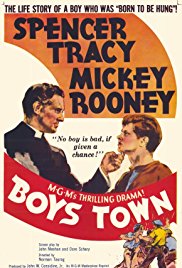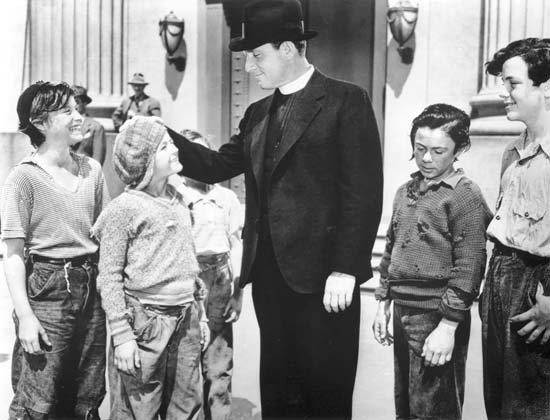BOYS TOWN
SUBJECTS — U.S./1913-1929 & Nebraska; Religions/Christianity;
SOCIAL-EMOTIONAL LEARNING — Male Role Model;
MORAL-ETHICAL EMPHASIS — Caring; Citizenship.
AGE:10-12; No MPAA Rating;
Drama; 1938; 94 minutes; B & W. Available from Amazon.com.
There is NO AI content on this website. All content on TeachWithMovies.org has been written by human beings.

SUBJECTS — U.S./1913-1929 & Nebraska; Religions/Christianity;
SOCIAL-EMOTIONAL LEARNING — Male Role Model;
MORAL-ETHICAL EMPHASIS — Caring; Citizenship.
AGE:10-12; No MPAA Rating;
Drama; 1938; 94 minutes; B & W. Available from Amazon.com.
This film is a fictionalized account of the life and achievements of Father Flanagan (1886 – 1948), the founder of Boys Town. Since 1917, Boys Town has provided refuge for delinquent and troubled boys (and now girls) of all faiths.
“Boys Town” shows a selfless man whose belief that there is no such thing as a bad boy made a difference in the lives of thousands of troubled young people. It provides an excellent introduction to the perennial debate between those who believe that wayward youth can be helped with education and compassion and those who believe that punishment is the only remedy for delinquent behavior.

Since at least the beginning of the 20th century there has been a debate in American society concerning how to deal with juvenile delinquents. The alternatives have been, on the one hand, to punish, restrict, and incarcerate them or, on the other hand, to help them learn a trade or skill and to encourage their feelings of self-worth. Different people and groups favor different mixtures of each alternative. Father Flanagan and others who shared his compassion for wayward boys moved the national consensus toward help, training, and encouragement and away from punishment and incarceration.
Father Flanagan said that “There are no bad boys. There is only bad environment, bad training, bad example, bad thinking.”
Father Flanagan’s Boys’ Home, as it was originally called, was founded in 1917 and moved to Overlook Farm in 1921. The residents voted to change the name to Boys Town in 1926. Boys Town has continued to expand and change its concept to adapt to the times. It has accepted girls since 1979. Boys Town serves children who have personal or family problems, or who have suffered emotional, physical or sexual abuse.
In 1974 Boys Town changed from providing institutional care to providing “family care.” Boys Town is now organized into homes with no more than six youths in each residence. Highly trained married couples serve as surrogate parents. They provide guidance and instruction on a 24-hour basis ensuring that the physical, emotional, and treatment needs of their charges are met.
Boys Town has established satellite campuses in communities across the U.S. There are also other organizations in the U.S. and in other countries called Boys Town which are not affiliated with Boys Town USA but which offer similar programs.
Do you agree with Father Flanagan that he never knew a bad boy or do you agree with the people who believe that the best way to handle juvenile delinquents is to punish or incarcerate them? What do you think should be done with juvenile delinquents?
Suggested Response:
There is no one right answer to this question.
1. See Discussion Questions for Use With any Film that is a Work of Fiction.
2. Why didn’t the Bishop agree to fund Boys Town?
3. What was it in Father Flanagan that prevented him from giving up?
Discussion Questions Relating to Ethical Issues will facilitate the use of this film to teach ethical principles and critical viewing. Additional questions are set out below.
(Be kind; Be compassionate and show you care; Express gratitude; Forgive others; Help people in need)
1. Do you agree with Father Flanagan that he never knew a bad boy or do you agree with the people who believe that the best way to handle juvenile delinquents is to punish or incarcerate them? What do you think should be done with juvenile delinquents?
2. Can too much caring and compassion for someone hurt him or her? Where do you draw the line?
3. Watch the movie West Side Story. What would have helped the Sharks and the Jets leave the gangs and move on with normal lives?
4. What would Father Flanagan have thought about the song, Gee, Officer Krupke?
(Do your share to make your school and community better; Cooperate; Stay informed; vote; Be a good neighbor; Obey laws and rules; Respect authority; Protect the environment)
5. What contribution did Father Flanagan make to American society?
If you want to know what Boys Town is doing today, visit the Girls and Boys Town Website.
In addition to websites which may be linked in the Guide and selected film reviews listed on the Movie Review Query Engine, the following resources were consulted in the preparation of this Learning Guide:
Last updated December 9, 2009.